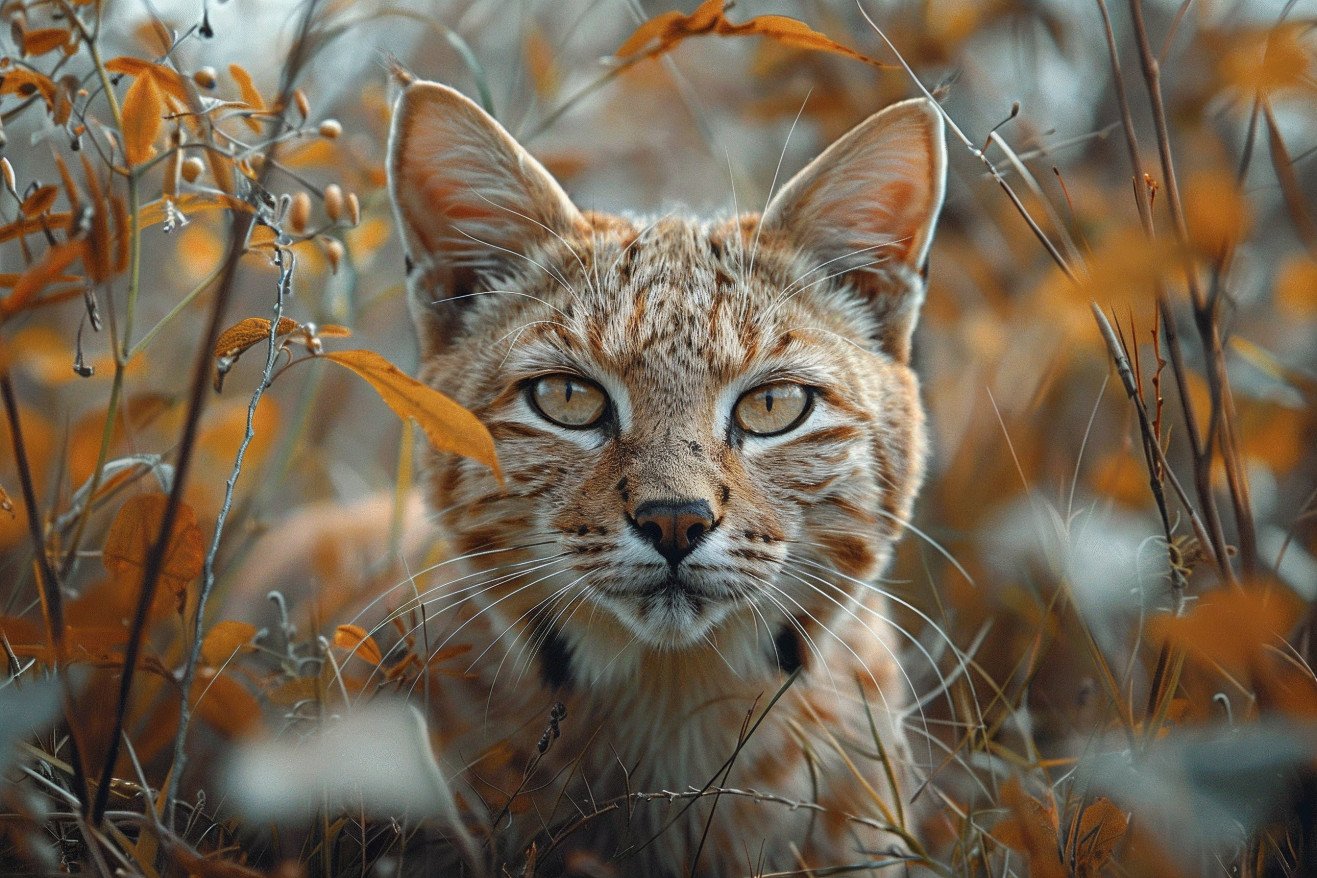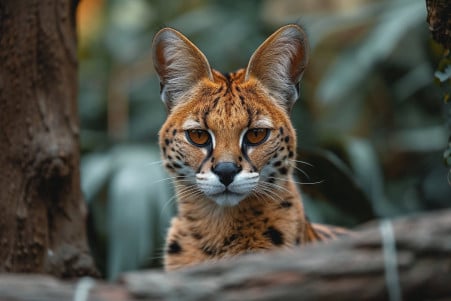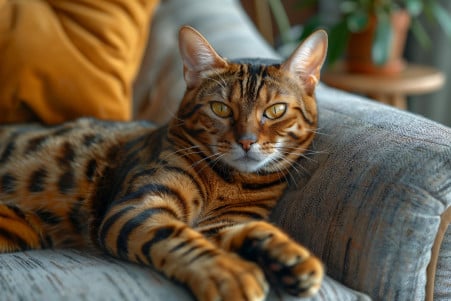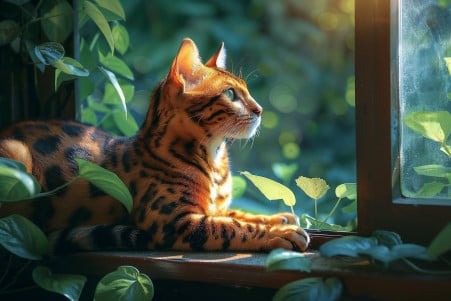Understanding Savannah Cats: Delving into Their Wild Nature and Behavior
15 April 2024 • Updated 15 April 2024

Despite their popularity as exotic pets, the wild blood in savannah cats makes it reasonable to wonder if they are dangerous. Savannah cats are a hybrid of a domestic cat and a serval, a medium-sized African wild cat known for its ability to jump to great heights. Because of their wild heritage, savannah cats are not recommended for first-time cat owners and can be unpredictable, territorial, and aggressive.
This article will delve into research on savannah cat behavior, care, and the challenges of owning a savannah cat. This will help you understand the wild traits and needs of savannah cats so you can decide if this special breed is right for you and if you can meet its unique requirements. This article is designed to help you make an educated decision about owning a savannah cat that will benefit both you and your pet.
Are Savannah Cats Dangerous?
Legality and Regulations of Savannah Cats
In the United States, the legality of owning Savannah cats depends on the state and even local laws. Some states have no restrictions on owning Savannah cats, while others have a complete ban or heavy regulations. According to World Population Review, the states of Georgia, Hawaii, Nebraska, and Rhode Island have a complete ban on owning Savannah cats as pets.
Other states have restrictions that depend on the generation or filial designation of the Savannah cat. For example, Litter Robot explains that Alaska, Colorado, Iowa, Massachusetts, New Hampshire, and Vermont only allow F4 generation and beyond Savannah cats, which means they have less wild heritage. New York only allows F5 and beyond generations.
It's important to research the laws in your area before getting a Savannah cat. Not following the laws can lead to serious consequences, including the pet being taken away and potentially euthanized, according to the Savannah Cat Association. To make sure that you're a responsible pet owner and that you prioritize the well-being of these cats, it's best to get a Savannah cat from a reputable breeder who follows all laws and regulations.
Common Savannah Cat Behavioral Traits and Issues
Although Savannah cats are not known to be aggressive, their wild roots mean they have strong hunting instincts and prey drives that can lead to potential problems. According to the Savannah Cat Association, cat aggression is often misunderstood, with play behaviors in kittens sometimes mistaken for true aggression. However, in Savannah cats, especially earlier generations with closer ties to the serval, this predatory nature can be more intense.
A study published in Petful showed that serval cats, the wild ancestors of Savannah cats, have an extremely high bite force of 172 Newtons, while feral domestic cats have a bite force of just 56 Newtons. While this bite force enables servals to take down larger prey, it can also lead to severe injuries if the cat is not properly socialized and trained. The Dumb Friends League notes that it's important to understand the signs of aggression, including restlessness, tail twitching, and skin rippling, so you can intervene before the aggression escalates.
Proper socialization, training, and environmental enrichment are especially important for Savannah cats, particularly those in the earlier generations. As the Savannah Cat Association points out, experienced owners who understand a Savannah cat's body language and can provide the right care and stimulation are key to preventing destructive or aggressive behaviors. Meanwhile, later generations, including F4 and beyond, are typically more socialized and adaptable, making them a better fit for owners who are less experienced with the breed.
Savannah Cat Temperament and Lifespan
Savannah cats are intelligent, active, and social animals. As stated by Petplan, they are "like mini-cheetahs in more than just appearance, with a large and distinctive breed recognized by its spotted coat, pointed ears, powerful build and expressive tail." The ASPCA Pet Health Insurance explains that Savannahs "usually adore getting attention and being around people" and "typically do well with families of all sizes and ages."
With proper socialization and supervision, Savannah cats can live with children and other pets. However, the Savannah Cat Association warns that their strong hunting instincts and prey drives mean they are not a good fit for homes with small animals such as fish, hamsters, or birds. As pointed out by WebMD, Savannah cats need "a significant amount of attention, stimulation, and environmental enrichment to prevent boredom and destructive behaviors."
It's important to make sure these active cats have enough room to move around, as well as vertical space to explore and play. Purina explains that Savannahs are "excellent jumpers" and can leap up to 8 feet horizontally. Although Savannah cats can be fun and entertaining pets, the Catster points out that they may not be the right choice for every household, especially those that are short on time or space, or have very young children.
Common Health Issues and Health Care Needs of Savannah Cats
Savannah cats are prone to a number of health problems, some of which are hereditary, while others are influenced by their environment. According to A1 Savannahs, these issues include progressive retinal atrophy (PRA), hypertrophic cardiomyopathy (HCM), and dental issues. Regular vet visits, genetic testing, and preventative care are important for helping to control these issues.
It’s also important to make sure that they are eating a high-quality diet that meets their specific needs, as PetMD explains that their genetic background may mean that they have special nutritional needs. Making sure that they get enough exercise and mental stimulation is also important for their overall health and well-being.
In order to protect them from diseases, parasites, and other issues like conflicts with wildlife, A1 Savannahs suggests that Savannah cats should be kept indoors. Reputable breeders will offer health guarantees and advice on how to care for these special cats.
How Savannah Cats Are Bred and the Importance of Generations
The Savannah is a special hybrid breed that is characterized by its filial generations - F1, F2, F3, and beyond. According to the Savannah Cat Breed, the F1 generation is the most sought after and expensive because it is the direct offspring of a serval. Males in this generation can weigh between 17 and 25 pounds and grow up to 18 inches tall. These early generations are also the closest to their wild serval ancestors and often have the strongest hunting instincts and most challenging temperaments.
As the generations move forward, the Savannah cats become smaller and more domesticated. The Savannah Cat Association explains that F2 males can weigh up to 30 pounds and F3 males can weigh between 14 and 20 pounds. By the time the cats reach the F4 and F5 generations, males are typically between 14 and 20 pounds, with 50% of F5 males being fertile, according to Amanukats.
The special breeding practices that go into creating Savannah cats mean that breeders have to take into account genetic concepts such as homologous chromosomes, zygosity, and meiotic drive, which are explained by the Savannah Cat Association. This means that breeders have to be especially careful when breeding these cats and make sure that they are only going to homes that can meet their unique needs.
Conclusion: Savannah Cats – A Unique Breed with Specific Needs
Savannah cats are not inherently dangerous, but their wild ancestry means they require experienced owners and proper care. While Savannah cats can make engaging companions, they possess strong hunting instincts and prey drives that can lead to potential issues.
Earlier generations of Savannah cats, such as F1 and F2, tend to be larger, more closely related to the serval, and generally more challenging to care for. As the generations progress, the Savannah cats become smaller and more domesticated, with the F4 and F5 generations typically being better suited for owners with less experience.
Providing adequate space, vertical territory, and opportunities for exercise and play is crucial for these high-energy felines. Savannah cats may not be suitable for all households, especially those with limited time or space, or with very young children. Responsible breeders should prioritize the well-being of these unique felines and only provide them to owners who can properly accommodate their specific needs.


